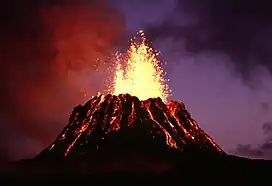Tephriphonolite or tephri-phonolite is a mafic to intermediate extrusive igneous rock in composition between phonotephrite and phonolite.[1] It contains 9 to 14% alkali content and 48 to 57% silica content (see TAS diagram).[2] Tephriphonolite is roughly equivalent to tephritic phonolite of the QAPF classification.[3]
Tephriphonolite has been found, for example, at Colli Albani volcano in Italy[4] and in the Asunción Rift of Paraguay.[5]
References
- ↑ "Unusual Lava Types". Strongly Alkaline Lavas. San Diego State University. Archived from the original on 2020-11-05. Retrieved 2016-09-11.
- ↑ Bailey, Roy A. (2004). "Eruptive History and Chemical Evolution of the Precaldera and Postcaldera Basalt-Dacite Sequences, Long Valley, California: Implications for Magma Sources, Current Seismic Unrest, and Future Volcanism". United States Geological Survey: 17.
{{cite journal}}: Cite journal requires|journal=(help) - ↑ Le Maitre, R.W. (editor) (2002). Igneous Rocks — A Classification and Glossary of Terms (2nd ed.). Cambridge: Cambridge University Press. p. 32. ISBN 0-521-66215-X.
{{cite book}}:|author=has generic name (help) - ↑ Campagnola, S.; Vona, A.; Romano, C.; Giordano, G. (2016). "Crystallization kinetics and rheology of leucite-bearing tephriphonolite magmas from the Colli Albani volcano (Italy)". Chemical Geology. Elsevier. 424: 12–29. Bibcode:2016ChGeo.424...12C. doi:10.1016/j.chemgeo.2016.01.012.
- ↑ Velázquez, V.F.; Riccomini, C.; de Barros Gomes, C.; Kirk, J. (2011). "The Cretaceous Alkaline Dyke Swarm in the Central Segment of the Asunción Rift, Eastern Paraguay: Its Regional Distribution, Mechanism of Emplacement, and Tectonic Significance". Journal of Geological Research. 2011: 1–18. doi:10.1155/2011/946701.
This article is issued from Wikipedia. The text is licensed under Creative Commons - Attribution - Sharealike. Additional terms may apply for the media files.
